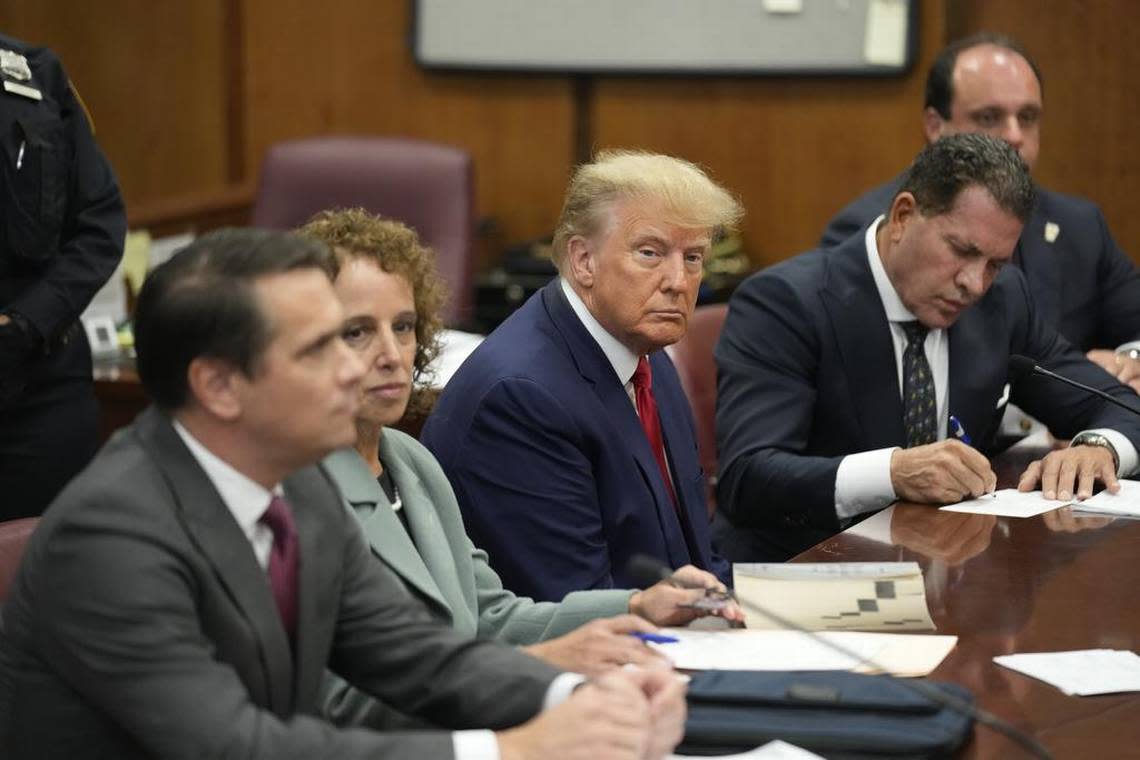Trump was found guilty of crimes in New York. Can he still vote in Florida?

Former President Donald Trump may officially be a convicted felon, but he’ll still likely be able to vote for himself in Florida this November.
While Florida law bars people convicted of most felonies from voting until they’ve fulfilled all terms of their sentence, Trump, a lifelong New Yorker who changed his residency to Florida in 2019, was convicted Thursday in his former home state.
The Florida Secretary of State’s website states that a “felony conviction in another state makes a person ineligible to vote in Florida only if the conviction would make the person ineligible to vote in the state where the person was convicted.” Under New York state law, even convicted felons are allowed to register to vote, so long as they’re not currently in prison.
For now, it’s unclear what kind of punishment Trump could receive. His sentencing hearing is currently scheduled for July 11. New York state law calls for a maximum four-year prison sentence for each of the 34 counts of falsifying business records that Trump was found guilty of on Thursday.
Trump could avoid prison time altogether, according to The New York Times, if the judge overseeing the case imposes a sentence of probation. Trump has also promised to appeal his conviction, which would have an effect on his voting status.
A 1977 memo by an assistant state attorney general to then-Florida Secretary of State Bruce Smathers says that convicted felons are not disqualified from voting during an appeal.
Glenn Burhans Jr., a Tallahassee attorney who practices election law, said that if Trump appealed the conviction, it would stay any potential incarceration, making him eligible to vote. Similarly, Jerry Goldfeder, the director of Fordham Law School’s Voting Rights and Democracy Project in New York, said the judge “won’t incarcerate him if it’s on appeal.”
Still, the jury’s decision has left some wondering about Trump’s voter status. Some have said outright that he would lose his right to vote.
“Trump can’t vote for himself in the November election. He can thank Florida Republicans for that,” state Sen. Jason Pizzo, a South Florida Democrat and attorney, posted Thursday evening on the social media site X.
In an interview with the Herald/Times on Thursday evening, Neil Volz with the Florida Rights Restoration Coalition said “we are in uncharted territory” regarding whether former President Donald Trump’s felony conviction would prevent him from voting for himself in the Florida November election.
Volz’s group led the work on Florida’s 2018 constitutional amendment that allowed Florida felons to regain the right to vote.
Typically, “Florida will defer to the rules in the state in which the person got the conviction,” Volz said. “We’re going to have to walk this one out because we are in uncharted territory and let New York’s process play out.”
Volz added: “After New York goes through their process, whether President Trump can vote with a felony conviction will depend on what the state of Florida does.”
He said that the U.S. Constitution was clear, however, in that Trump could still run for president and get votes in Florida.
“The Constitution’s pretty clear that he can run,” Volz said. “For the federal office, the presidency is mentioned in the constitution.” He added that the federal constitution would override anything in Florida law.
Volz said his organization saw Trump’s predicament as “an opportunity to shine a light” on “voter eligibility for convictions.”
He added: “We believe that no one should be above the law or below the law when it comes to voter eligibility for convictions. Everybody should be held to the same standard.”
Trump is widely seen as the favorite to win the state in November. Polls show him running well ahead of President Joe Biden, and his singular vote almost certainly won’t have an impact on the overall election results.
An NPR/PBS/Marist College poll released Thursday found that 67% of voters said that a guilty verdict in Trump’s trial would not affect their vote, while 17% said it would make them less likely to vote for him in November. Another 15% said a guilty verdict would make them more likely to vote for Trump.
Palm Beach County Supervisor of Elections Wendy Sartory Link did not respond to phone calls and text messages requesting comment on Trump’s voting status. A spokesperson for Trump’s campaign didn’t respond to a request for comment.

